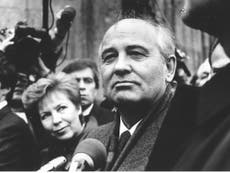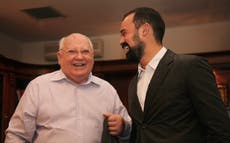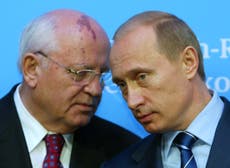Gorby and me: I spent a summer living in Gorbachev’s USSR – this is what it was like
The Metro was wonderful, full of ornate chandeliers, and with scary-looking babooshkas sitting at the bottom of every escalator. I was too afraid to ask why

Yazz and the Plastic Population (ask your parents) were top of the charts, and Big was, appropriately, the biggest movie of the year. But 1988 for me was all about Mikhail Gorbachev and the USSR.
“Studying” at university, we were generously offered the chance to spend a summer living and learning a language abroad, even though it was only a small part of our course. The choices were French (couldn’t pronounce the words, still can’t), Spanish (my arrogant 18-year-old self said I already knew enough to get by after a couple of holidays), German (no thanks), or Russian, the language, according to US President Ronald Reagan of the “Evil Empire”.
There was little contest, as while my friends were getting ready to spend a summer in Pamplona, Provence or Berlin, the lure of Moscow was too strong. That might seem strange, but at the time of the Cold War, one half of Europe was virtually cut off to us in the West, and the only thing we ever saw or read about the USSR was grim. It was all about nuclear threats, grey people queuing up for food, and a long line of ancient leaders regularly dying and having funerals in the snow.
It was a complete and utter mystery in a way that countries and places are just not nowadays, and here was a once-in-a-lifetime chance to go and visit. And more than just visit, live there, even if just for a short while.
It was also the place ruled by the most talked about world leader of the time, Gorbachev. Thanks to him, everybody in the West knew two Russian words – “glasnost” and “perestroika”, spoke endearingly about “Gorby” and watched Spitting Image turn the birthmark on his forehead into a hammer and sickle.
Life behind the Iron Curtain didn’t disappoint, but it certainly shocked. We were effectively cut off from all communication with the outside world, the only English language newspaper I could buy was the Morning Star and from one place only – the Hotel Rossiya right next to Red Square – so my walk to the newsagents every day took me past St Basil’s Cathedral and Lenin’s tomb, which I told myself was the best paper walk in the world.
Moscow was a blur of filthy, diesel lorries and Soviet monuments. Lenin was everywhere. It was an atheist state, but I had never seen so many churches. It was sweltering, although we had been told it was freezing 12 months a year. I bumped into East Germans, who looked decidedly poorer than their West German cousins. I sold jeans on the black market and thought I was a hustler.
The Metro was wonderful, full of ornate chandeliers, and with scary-looking babooshkas sitting at the bottom of every escalator. I was too afraid to ask why. I looked on open-jawed as people used a machine in almost every street to drink something called “Kvass”, a mildly alcoholic beer. All machines had two taps, one to wash the glass out with water, the other for Kvass. Everyone used the same glass.
And the people were, at first, a mystery. We eyed each other warily, aware we were rarely-spotted symbols of each other’s ideologically-opposed worlds; Muscovites had a habit of staring straight at you, stony-faced. It was scary, especially since I was asked to fight by strangers simply because I was a foreigner. But as soon as you attempted speaking to people, the faces (usually) broke into a smile. Russians were warm, poetic, passionate, funny, seemed to love French literature and they really did drink. They took carrier bags everywhere with them just in case they were able to find anything in the astonishingly poorly-stocked shops, especially food.
It was clear Gorbachev’s attempt at reforms were already struggling, and food seemed to be the frontline. I was hungry permanently. I once went to Gorky Park only because of rumours of a pizza van there, and I don’t like pizza. One evening meal consisted of fat in jelly. I visited a rare open restaurant and was told to go away, as the state-paid waiters earned the same if they didn’t serve anyone as if they did. Bizarrely, the only food I could find plenty of was caviar, which seemed to be available at every official event.
To keep up to speed with all the latest opinions and comment, sign up to our free weekly Voices Dispatches newsletter by clicking here
Visiting supermarkets could be desperate, with long aisles of empty shelves everywhere. It was like intruding upon a nation’s grief. There were already murmurings about Gorbachev, but at least Russians spoke about him. On my last visit to Russia in 2018, any chat about Putin with locals was immediately shut down. Bizarrely, I became rich as the black market exchange rate gave me so many roubles for my pounds, I couldn’t spend enough. There was nothing to spend money on, unless you wanted another tome on Lenin’s contribution to revolution.
I ended up giving my money to a Russian friend who I regularly went to football matches with – he loved Spartak Moscow as they weren’t the army or the police team. At the end of every match, the crowd would stay and wait for the raffle for a Lada car, then whistle and jeer when nobody won. He worked as an economist but was wary of Gorbachev’s reforms (perestoika, or reconstruction) and wondered what might happen to the country.
When I got home to the UK, we kept in touch. He and his wife had been so welcoming to British strangers, regularly inviting us to their Moscow flat, helping with language and talking about anything. I still recall us drunkenly laughing at what the surname of one of his favourite footballers, Vasily Rats, meant in English. We wrote to each other after I returned home and it was only months later he admitted – and guiltily apologised – for not telling me he had a son.
He had made sure the boy was never there when I visited just in case of any problems from the Russian authorities. Gorbachev’s glasnost (political openness) reform wasn’t quite cutting through.



Join our commenting forum
Join thought-provoking conversations, follow other Independent readers and see their replies
Comments